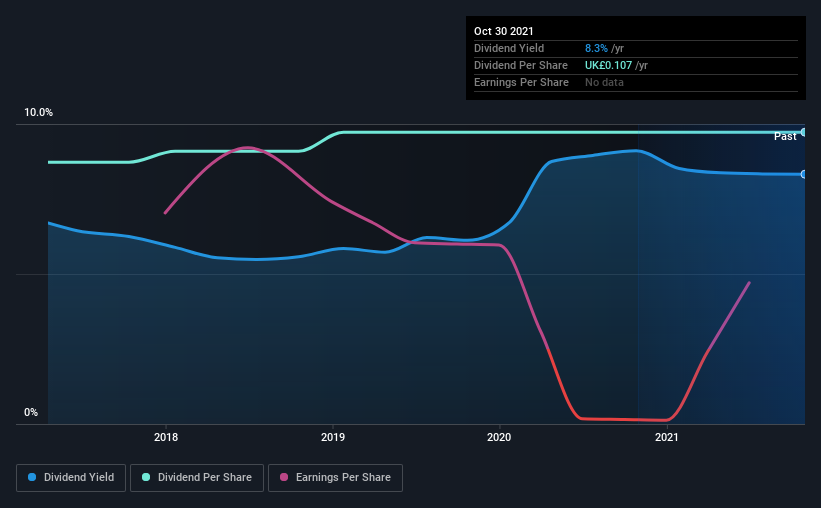Do These 3 Checks Before Buying EJF Investments Limited (LON:EJFI) For Its Upcoming Dividend
Readers hoping to buy EJF Investments Limited (LON:EJFI) for its dividend will need to make their move shortly, as the stock is about to trade ex-dividend. The ex-dividend date occurs one day before the record date which is the day on which shareholders need to be on the company's books in order to receive a dividend. The ex-dividend date is important because any transaction on a stock needs to have been settled before the record date in order to be eligible for a dividend. Accordingly, EJF Investments investors that purchase the stock on or after the 4th of November will not receive the dividend, which will be paid on the 30th of November.
The company's next dividend payment will be UK£0.027 per share. Last year, in total, the company distributed UK£0.11 to shareholders. Calculating the last year's worth of payments shows that EJF Investments has a trailing yield of 8.3% on the current share price of £1.285. Dividends are a major contributor to investment returns for long term holders, but only if the dividend continues to be paid. As a result, readers should always check whether EJF Investments has been able to grow its dividends, or if the dividend might be cut.
See our latest analysis for EJF Investments
Dividends are typically paid from company earnings. If a company pays more in dividends than it earned in profit, then the dividend could be unsustainable. Its dividend payout ratio is 81% of profit, which means the company is paying out a majority of its earnings. The relatively limited profit reinvestment could slow the rate of future earnings growth. We'd be concerned if earnings began to decline.
When a company paid out less in dividends than it earned in profit, this generally suggests its dividend is affordable. The lower the % of its profit that it pays out, the greater the margin of safety for the dividend if the business enters a downturn.
Click here to see how much of its profit EJF Investments paid out over the last 12 months.
Have Earnings And Dividends Been Growing?
Businesses with shrinking earnings are tricky from a dividend perspective. If business enters a downturn and the dividend is cut, the company could see its value fall precipitously. EJF Investments's earnings per share have fallen at approximately 13% a year over the previous five years. Ultimately, when earnings per share decline, the size of the pie from which dividends can be paid, shrinks.
Another key way to measure a company's dividend prospects is by measuring its historical rate of dividend growth. EJF Investments has delivered 2.2% dividend growth per year on average over the past five years. The only way to pay higher dividends when earnings are shrinking is either to pay out a larger percentage of profits, spend cash from the balance sheet, or borrow the money. EJF Investments is already paying out 81% of its profits, and with shrinking earnings we think it's unlikely that this dividend will grow quickly in the future.
The Bottom Line
Has EJF Investments got what it takes to maintain its dividend payments? We're not overly enthused to see EJF Investments's earnings in retreat at the same time as the company is paying out more than half of its earnings as dividends to shareholders. This is not an overtly appealing combination of characteristics, and we're just not that interested in this company's dividend.
With that in mind though, if the poor dividend characteristics of EJF Investments don't faze you, it's worth being mindful of the risks involved with this business. For example, EJF Investments has 2 warning signs (and 1 which makes us a bit uncomfortable) we think you should know about.
We wouldn't recommend just buying the first dividend stock you see, though. Here's a list of interesting dividend stocks with a greater than 2% yield and an upcoming dividend.
This article by Simply Wall St is general in nature. We provide commentary based on historical data and analyst forecasts only using an unbiased methodology and our articles are not intended to be financial advice. It does not constitute a recommendation to buy or sell any stock, and does not take account of your objectives, or your financial situation. We aim to bring you long-term focused analysis driven by fundamental data. Note that our analysis may not factor in the latest price-sensitive company announcements or qualitative material. Simply Wall St has no position in any stocks mentioned.
Have feedback on this article? Concerned about the content? Get in touch with us directly. Alternatively, email editorial-team (at) simplywallst.com.

